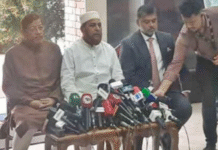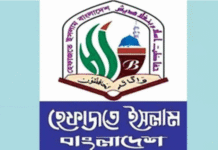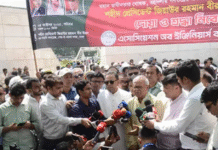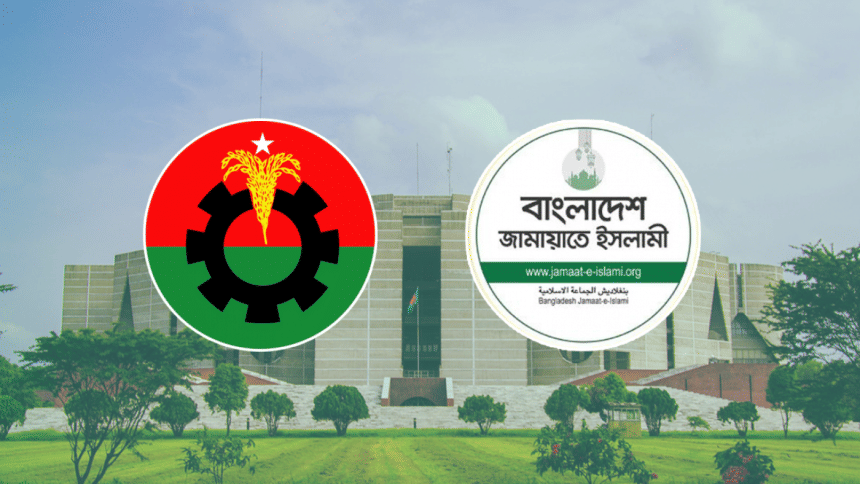
The BNP and Jamaat-e-Islami now seem to be poles apart over when the local and parliamentary elections should be held and the proportional representation system in the House.
The fact that their relationship is strained became clear as day last week when the parties took opposing stances on the timing of the polls and on proportional representation.
Yesterday, both parties made statements that hint at new political dynamics ahead of the 13th national polls.
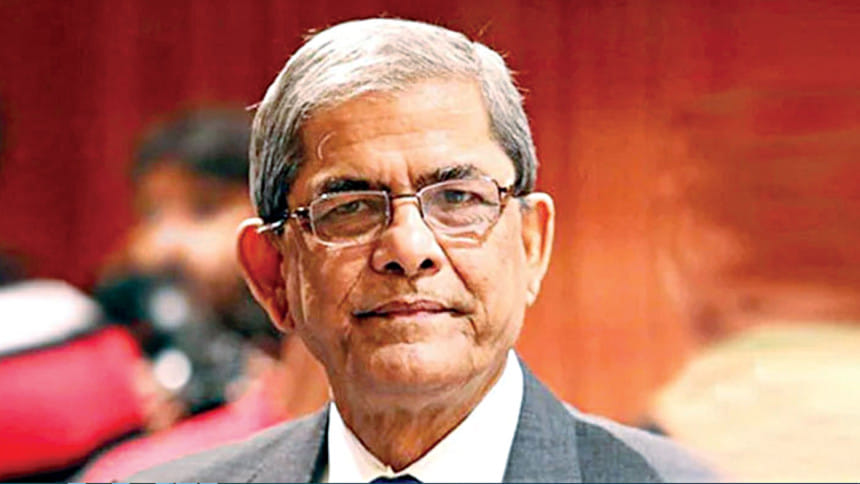
“We are against proportional representation. We will not support proportional representation in any way because people of the country are not accustomed to it.”
After a Jamaat delegation called on Chief Election Commissioner AMM Nasir Uddin at the Nirbachon Bhaban yesterday morning, its Secretary General Mia Golam Parwar told reporters that the party demanded that the national election be held after completing reforms to the state institutions relevant to the electoral process.
He claimed the people want local government polls before the national election and that his party is with the people. He said they also demanded proportional representation in the House.
An hour later, asked about the Jamaat’s stance, BNP Secretary General Mirza Fakhrul Islam Alamgir said, “We are against proportional representation. We will not support proportional representation in any way because people are not accustomed to it.”
Proportional representation is an electoral system in which the distribution of seats corresponds with the proportion of the total votes cast for each party. For example, if a party gets 40 percent of the total votes, the system will allow it to get 40 percent of the seats in parliament.
In Bangladesh, the first-past-the-post (FPTP) system is practised, in which the candidate receiving the highest number of votes in a constituency wins a seat in parliament.
The Electoral Reform Commission has proposed having an upper and a lower house. It recommended a proportional representation system for the upper house.
It also cited a strong disagreement among political parties regarding the proportional representation system.
Fakhrul yesterday said that holding local polls before the national election would push the country further into instability.
“The sooner the [national] election is held, the easier politics will become. The people will return to a stable situation,” he said at a press briefing at the BNP chairperson’s Gulshan office.
He said the election is crucial for two reasons. “Firstly, for restoring stability, and secondly, for improving governance in the country, which is currently facing significant challenges.”
Fakhrul also expressed concerns over the state of education at universities and colleges, saying, “It is very difficult to address these issues without an elected government.”
Yesterday, Chief Adviser Prof Muhammad Yunus, now in Dubai, said the national election could be held in December this year.
Late last year, he had hinted the polls could be in late 2025 or mid 2026, after which the crack in BNP-Jamaat relationship started becoming more visible.
The BNP and its allies had been saying they want the national election with minimal reforms done so that the elected government can carry out all other reforms. They have also been pushing for the polls to be held in the middle of this year.
The Jamaat has been demanding polls after necessary reforms and without any hurry.
When Yunus on January 8 said they were simultaneously preparing for national and local body elections, it pushed the parties even further apart.
After a BNP delegation met Yunus on Monday, Fakhrul told the press that the government assured the party of working to hold the national election by December this year. “We’re making it clear, as we did in the past, there will be no election before the national polls.”
Jamaat Ameer Shafiqur Rahman at a rally in Sylhet that day said, “Fundamental reforms are necessary before the election. Without implementing some basic reforms, a fair election will not be possible. If an election is held under the current circumstances, it will be an election genocide. We do not want that. We want elections to be held only after a conducive environment is established.”
Yesterday, the Jamaat delegation met the EC even though it is no longer a registered political party. Not being registered with the EC renders the Jamaat unable to run in elections.
Parwar said their appeal to get their registration restored was pending with a court. He hoped they would get justice.
The four-party alliance, including the BNP and Jamaat, was formed in 1999 to strengthen the movement against the then Awami League-led government.
In the 2001 election, the BNP-led alliance won a landslide, and two top Jamaat leaders were made cabinet members.
But the alliance fared poorly in the 2008 election.
In 2012, it became a 20-party combine as several other parties joined in.
The next year, the HC declared Jamaat’s registration with the EC illegal on grounds that some provisions of the Jamaat charter went against the country’s constitution and election laws.
In the face of widespread criticism for its ties with the Jamaat, which opposed the Liberation War and had sided with Pakistan, the BNP had been keeping a distance from the Islamist party for the past few years.
The 20-party alliance dissolved in December 2022 after the BNP asked its allies not to use the name of the alliance.

